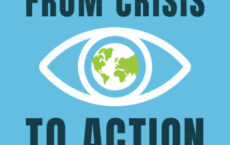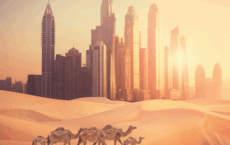
1. What makes the book particularly timely and urgent in today’s global climate conversation? Why is now a critical moment to publish this book? This book re-emphasises the fact that the climate crisis is not only a future threat but also a daily reality for many communities across the world. In recent years, I have […]
Read MoreWhat happens when a state is not just funded by carbon—but fundamentally formed by it? In the hydrocarbon-rich monarchies of the Gulf, energy has never been a mere commodity. It has served as the scaffolding of sovereignty, development, and modern statehood. Since the mid-20th century, oil and gas revenues have enabled a political economy rooted […]
Read MoreEach year, more than 20 million people on average are displaced by floods, hurricanes, wildfires, and droughts, and that number will increase in coming decades as the impacts of climate change strengthen and the number of people living in locations exposed to hazards grows. How many more people will be on the move – voluntarily […]
Read MoreWe have seen a relatively rapid progress of the energy transition in recent years, with increased adoption of wind and solar power, electrification of heating and transport as well as an amplification of innovation pursuits in energy storage, in particular batteries. Equally, we have witnessed energy security rising to the front of discussions. Recent incidents […]
Read MoreThe headline shouts, “Genetics is a big reason divorce runs in families.” It is common nowadays to hear that some surprising aspect of human behavior is “heritable.” Often it is said about intelligence, but one also hears it about personality, mental illness, sexual orientation, or even marital status. What does this mean? The word sounds […]
Read MoreImagine if the government ranked banks according to their investments in the oil and gas industries or rated and labelled food and clothing companies based on their poor carbon footprint. Would you react to this type of “naming and shaming” by avoiding companies that contribute to global warming? Surveys suggest yes. This is the concept […]
Read MoreA quick Internet search reveals various Truth About books: on nutrition, cancer, Covid, vinyl records, lies, …, to name a few. But whose truth should we believe, learn about, or invest precious time reading? In an ever-confusing and divided world, one has to do one’s homework.
Read MoreConservation in the Context of a Changing World: Concepts, Strategies, and Evidence Many issues in contemporary conservation provoke strong responses. Rewilding, mother trees, megafaunal extinctions, bioprospecting, the rights of nature, and other polarizing issues elicit intense reactions. In Conservation in the Context of a Changing World: Concepts, Strategies, and Evidence, I provide historical, ecological, and […]
Read More1. What makes the book particularly timely and urgent in today’s global climate conversation? Why is now a critical moment to publish this book? This book re-emphasises the fact that the climate crisis is not only a future threat but also a daily reality for many communities across the world. In recent years, I have […]
Read MoreWhat happens when a state is not just funded by carbon—but fundamentally formed by it? In the hydrocarbon-rich monarchies of the Gulf, energy has never been a mere commodity. It has served as the scaffolding of sovereignty, development, and modern statehood. Since the mid-20th century, oil and gas revenues have enabled a political economy rooted […]
Read MoreEach year, more than 20 million people on average are displaced by floods, hurricanes, wildfires, and droughts, and that number will increase in coming decades as the impacts of climate change strengthen and the number of people living in locations exposed to hazards grows. How many more people will be on the move – voluntarily […]
Read MoreWe have seen a relatively rapid progress of the energy transition in recent years, with increased adoption of wind and solar power, electrification of heating and transport as well as an amplification of innovation pursuits in energy storage, in particular batteries. Equally, we have witnessed energy security rising to the front of discussions. Recent incidents […]
Read MoreThe headline shouts, “Genetics is a big reason divorce runs in families.” It is common nowadays to hear that some surprising aspect of human behavior is “heritable.” Often it is said about intelligence, but one also hears it about personality, mental illness, sexual orientation, or even marital status. What does this mean? The word sounds […]
Read MoreImagine if the government ranked banks according to their investments in the oil and gas industries or rated and labelled food and clothing companies based on their poor carbon footprint. Would you react to this type of “naming and shaming” by avoiding companies that contribute to global warming? Surveys suggest yes. This is the concept […]
Read MoreA quick Internet search reveals various Truth About books: on nutrition, cancer, Covid, vinyl records, lies, …, to name a few. But whose truth should we believe, learn about, or invest precious time reading? In an ever-confusing and divided world, one has to do one’s homework.
Read MoreConservation in the Context of a Changing World: Concepts, Strategies, and Evidence Many issues in contemporary conservation provoke strong responses. Rewilding, mother trees, megafaunal extinctions, bioprospecting, the rights of nature, and other polarizing issues elicit intense reactions. In Conservation in the Context of a Changing World: Concepts, Strategies, and Evidence, I provide historical, ecological, and […]
Read MoreKeep up with the latest from Cambridge University Press on our social media accounts.
University of Virginia
Finnish Environment Institute
Wilfrid Laurier University
The Ohio State University
Ministry of Finance, Ghana
The Joy of Science
Simon Mitton is a Life Fellow at St Edmund\\\\\\\\\\\\\\\'s College, University of Cambridge. For more than fifty years he has passionately engaged in bringing discoveries in astronomy and cosmology to the general public. He is a Fellow of the Royal Historical Society, a former Vice-President of the Royal Astronomical Society, and a Fellow of the Geological Society. The International Astronomical Union designated asteroid 4027 as Minor Planet Mitton in recognition of his extensive outreach activity and that of Dr Jacqueline Mitton.
Bruce Rocheleau is a Professor Emeritus in the Department of Public Administration, Northern Illinois University.
University of Illinois, Urbana-Champaign
David E. Fastovsky is Professor and Chair of the Department of Geosciences at the University of Rhode Island.
Julian Cribb FRSA FTSE is an Australian author and science communicator.
Mike Berners-Lee consults, thinks, writes and researches on sustainability and responses to 21st century challenges.
Ecology, Evolution and Behaviour of Wild Cattle
The Joy of Science
Staff Scientist, Brigham and Women’s Hospital, Department of Neurology with affiliation to The Broad Institute of Harvard and MIT.
Roger G. Barry, University of Colorado Boulder
Icebergs
Conservation of Freshwater Fishes
The Evolution of Human Sociability
The Choanoflagellates: Evolution, Biology and Ecology
Climate Change: A Wicked Problem
Climate Change, Capitalism and Corporations
Climate Change, Capitalism and Corporations
Colours and Colour Vision
Strategically Created Treaty Conflicts and the Politics of International Law
Fred D. Singer Radford University, Virginia
Matt lloyd
Zoology, Evolutionary Biology, Ecology
Geomorphology in the Anthropocene
Geomorphology in the Anthropocene
The Volcano Adventure Guide
The Philosophy of Human Evolution
Toxic Loopholes: Failures and Future Prospects for Environmental Law
Why We Disagree About Climate Change
The Ecology of Oil
Discoveries of the Census of Marine Life
Evolution, Creationism, and the Battle to Control America\'s Classrooms
Talking About Life: Conversations on Astrobiology
Animal Homosexuality
Evolution, Creationism, and the Battle to Control America\\\\\\\'s Classrooms
U.S. Energy Policy and the Pursuit of Failure
Too Hot to Touch
Biosimulation
Library marketing associate
Too Hot to Touch
The Weather Observer\\\\\\\\\\\\\\\\\\\\\\\\\\\\\\\\\\\\\\\\\\\\\\\\\\\\\\\\\\\\\\\\\\\\\\\\\\\\\\\\\\\\\\\\\\\\\\\\\\\\\\\\\\\\\\\\\\\\\\\\\\\\\\\'s Handbook
Eruptions that Shook the World
Bioethics
Does Your Family Make You Smarter?
Senior Inbound Marketing Executive
Evolution - Selected Letters of Charles Darwin 1860–1870
Giraffe: Biology, Behaviour, and Conservation
Calculus for the Ambitious
Marmot Biology
Dangerous Neighbors
Life Beyond Earth
Life Beyond Earth
Introduction to Cancer Biology
The Weather and Climate: Emergent Laws and Multifractal Cascades
Antarctica - Global Science from a Frozen Continent
The Domestic Cat
Assistant manager (e-products)
The Systems View of Life
The Systems View of Life
Human Evolution
Landslide Ecology
Landslide Ecology
Fungal Biology in the Origin and Emergence of Life
To receive updates on Earth & Life Sciences news from Cambridge University Press and Fifteen Eighty Four, please join our email list below. We will not disclose your email address to any third party









